10 best open source web browsers
You all know about the best mainstream web browsers like Chrome, Opera, Safari, etc. But what about open source browsers? If you like to use open source software, there are many options available to you.
In this article, we will look at the 10 best open source browsers. Let's find out soon!
10 best open source web browsers
- Why use open source browsers?
- 10 best open source web browsers
- 1. Chromium
- 2. Midori
- 3. Pale Moon
- 4. Links
- 5. Dooble
- 6. QtWeb
- 7. QupZilla
- 8. Konqueror
- 9. SeaMonkey
- 10. Firefox
- Which open source web browser should you use?
Why use open source browsers?
Like all open source software, the use of open source browsers offers several advantages. Perhaps most importantly, it allows you to trust the software.
Browsers are placed in the application world, meaning they can track you in ways other applications can't. Since we are always monitored by government and online advertising companies, it is hard to trust closed source software providers. And suppliers are under the control of surveillance laws.
The nature of an open source browser means that anyone can research, verify and detect problems. You may feel more comfortable without being followed.
Other benefits of open source browsers reflect the benefits of open source software in general, such as customization, flexibility and community support.
10 best open source web browsers
1. Chromium
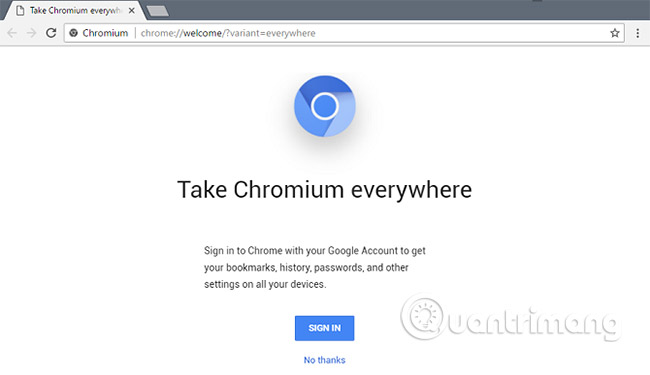
Chromium is Chrome's twin brother. Google is responsible for launching both projects. However, while most Chrome apps are still proprietary and closed source, Chromium is completely open source software.
Chromium uses the Blink tool. It is like a tool used by Chrome, which means there is hardly any difference between the two interfaces or features available. You can even install Chrome widgets on Chromium. Although it is important to note that unlike Chrome, Chromium does not have a stable release because it is always developed. You must manually update in Chromium, and Chrome will automatically do it for you.
So, there are some alternatives to Chromium if you want to use another application.
For more on the differences between Chrome and Chromium, please refer to the article: How are Chromium and Chrome different?
Download Chromium.
2. Midori

If you are a Linux user, you probably already know about Midori. It is the default browser on Elementary OS (Base OS). For Windows, you can download it as an executable file or run as portable software.
Midori is very light and fast. Developers have worked hard to make it consistent with the Xfce philosophy: Make as much as possible with the resources available.
Although very light, the browser is proud to have all the important features like RSS support, integrated spell checker, bookmarks and extensive settings menu.
Download Midori.
3. Pale Moon

Pale Moon was originally considered a branch of Firefox, but now it has nothing to do with this browser. It has a layout engine and offers a completely different set of features.
Customization is the leading factor in this application. You can change its theme, reorganize the interface, create a new look for your own Pale Moon and more.
With smart features, you can hope to find some exclusive Pale Moon utilities, the option to support HTML5 and CSS3 and tab management screens. Firefox extensions also work in this application.
Download Pale Moon.
4. Links
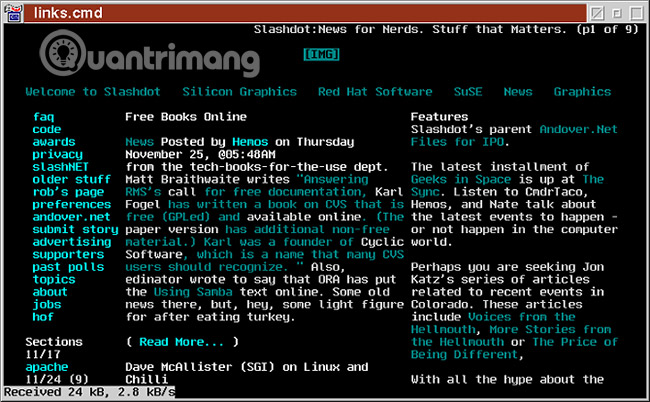
Links are slightly different from other browsers on this list. It has some new things that you'll have to 'wrestle' to find on other browsers.
These new things include fonts compiled into binary in gray bitmap format, instead of starting from the system (to allow the browser to become an EXE file) and adjust the gamma parameters for the image. 48 bit high quality.
Other features include a pull down menu, HTML 4.0 support and DNS Lookup background.
Download Links.
5. Dooble
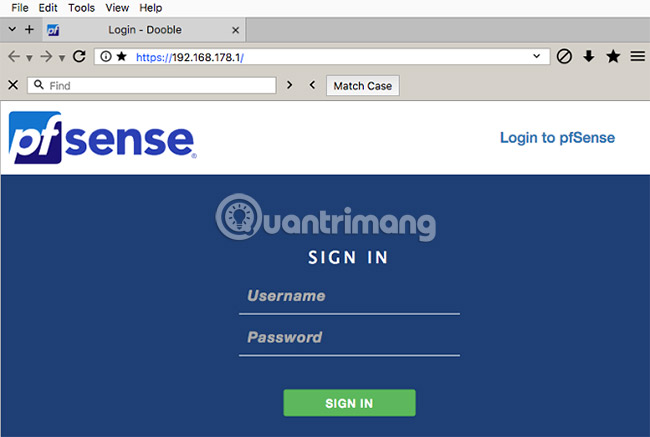
Dooble is less popular than some other browsers in this article, but it deserves mention.
You will notice that each browser discussed here has a specific 'forte'. Dooble is one of the browsers that has the strength to ensure privacy.
For example, it can block iFrames from a third-party content provider, automatically delete cookies, use the YaCy distributed search engine, and store all encrypted data.
Download Dooble.
6. QtWeb

QtWeb uses the framework of Qt and WebKit layout engine to create fast and highly secure open source browsers.
This is one of the most feature-rich browsers on this list. Notable features include the original torrent download manager, ad blocker, mouse gesture support, security mode and pop-up blocker.
Interestingly, QtWeb also provides a method to save web pages as PDF. It is a useful feature if you know you will be offline for a long time and need documents to view during that time.
Download QtWeb.
7. QupZilla
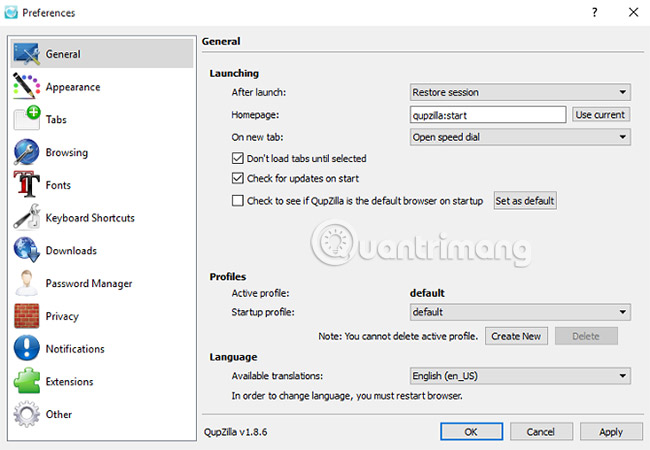
QupZilla started out as a research project, but since then, it has been developed to become a feature-rich browser, operating on multiple platforms.
When first released in late 2010, the application used Python. However, the developers soon overhauled it and rewrote the entire browser in C ++ language with Qt Framework.
All common features are still maintained, including a bookmark bar and browsing history. It also comes with an ad blocker that is enabled by default.
Download QupZilla.
8. Konqueror
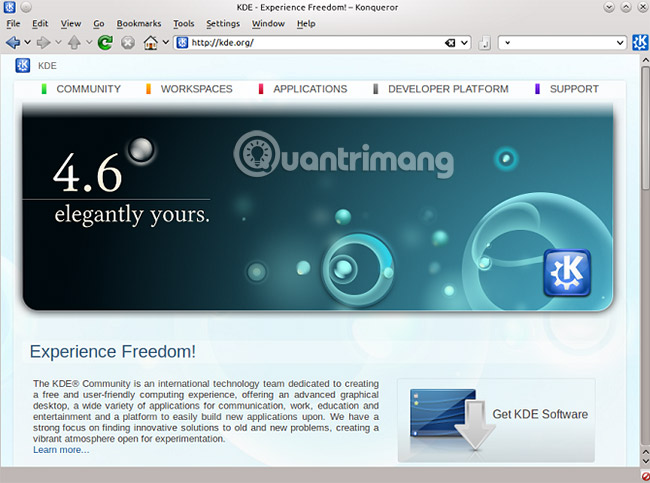
Konqueror is a multi-purpose application. In addition to being a web browser, it also acts as a file manager, PDF viewer, FTP client, text editor, spreadsheet editor, Word document editor and more.
Konqueror has a password manager, popup blocker and live language translation support.
It should be noted that in order to run Konqueror on Windows, you will need to install the KDE libraries. KDE on non-Linux systems is still in beta, so this browser may not be suitable if you're not tech-savvy.
Download Konqueror.
9. SeaMonkey
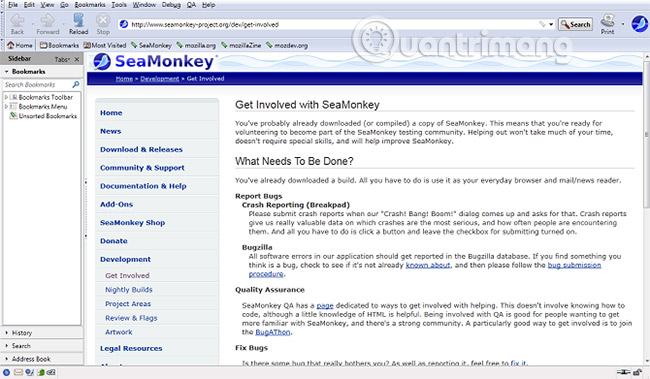
Like Konqueror, SeaMonkey is not just a web browser. It serves as an all-in-one Internet application suite.
SeaMonkey provides an integrated email application, an integrated chat application and even an HTML editor that allows you to develop your own websites (the process is quite simple).
Other interesting features include password manager, mouse gestures and a unique feature in this list - voice interaction. Finally, the application has its own add-ons library.
Download SeaMonkey.
10. Firefox
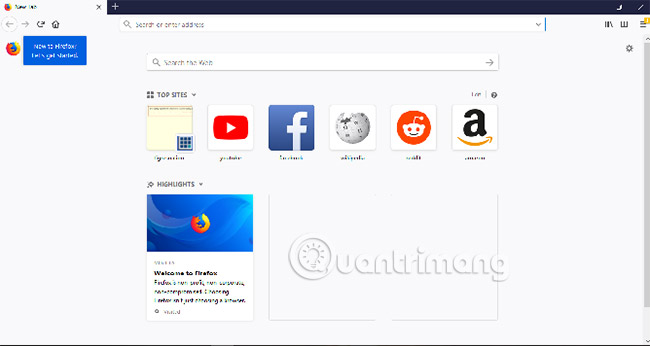
It would be a mistake to talk about the list of open source web browsers without mentioning Mozilla Firefox. The application has grown to become the second most popular browser in the world after Chrome.
Its list of features includes:
- Cross-sync between devices
- Password manager
- Private browsing
- Block the tracker
- An extensive additional library
Download Firefox.
Which open source web browser should you use?
After reading the article, you may have noticed that no browser is called 'best'. The decision is based on the features that are important to you.
For example, for anyone who has been with Chrome for a long time and wants a smooth transition, choose Chromium. Use the quick summary below to decide which browser is best for you:
- Familiar: Chromium, Firefox.
- Speed: Midori, QtWeb.
- Customize ability: Pale Moon.
- Flexibility: Links, Konqueror.
- Security: Dooble.
- Endless features: QtWeb, QupZilla, SeaMonkey.
Wish you find the browser that best suits you!
See more:
- Top 10 most popular browsers, Google Chrome tops, Second IE
- Top 10 special Web browsers you don't know yet
- 7 unexpected capabilities of the web browser